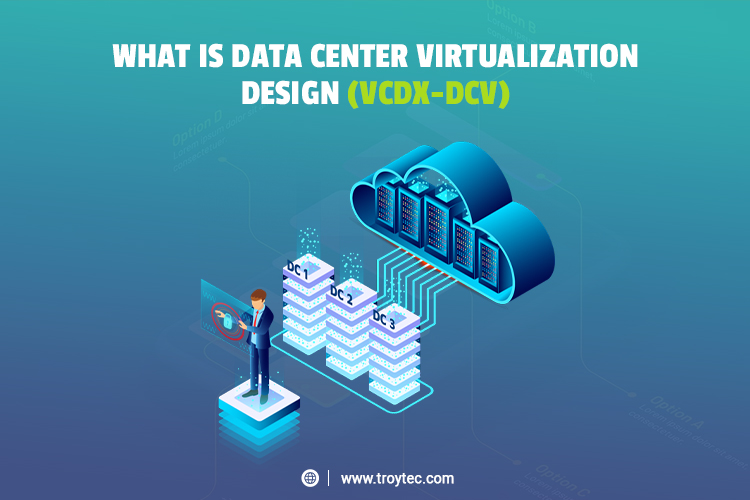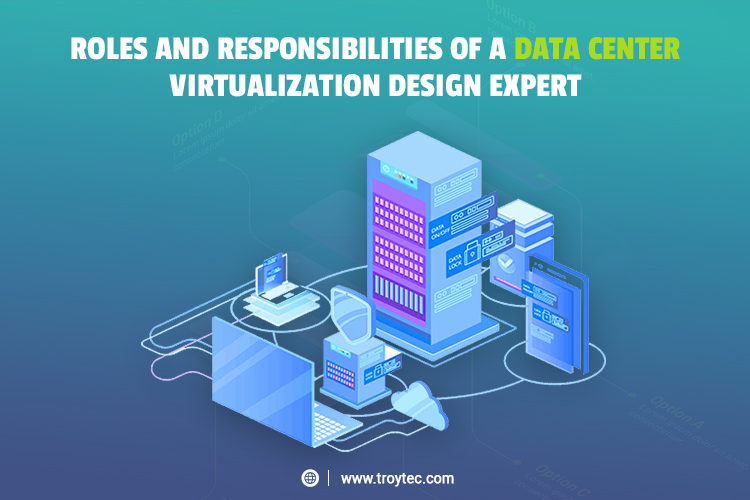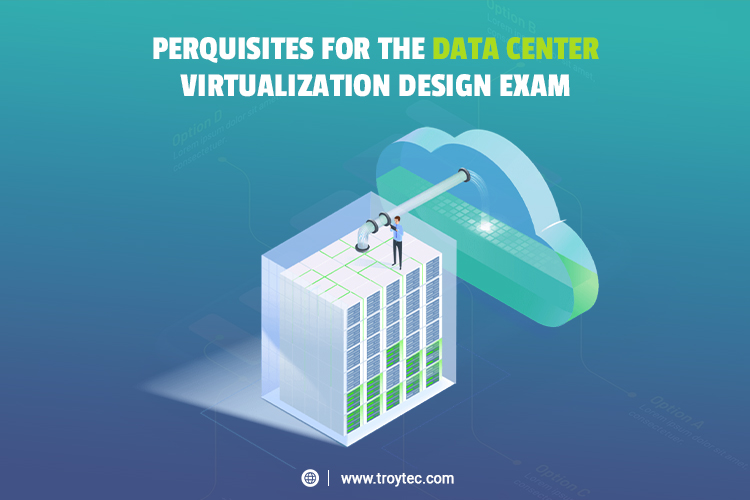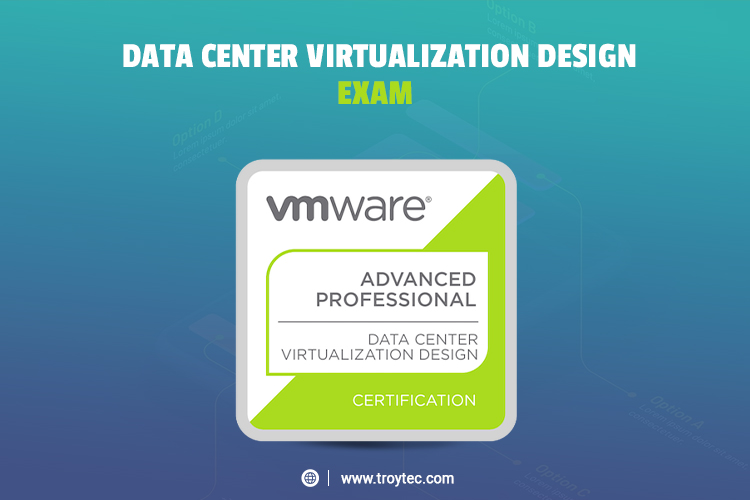Data center virtualization, or DCV, is a foundation of IT effectiveness, suppleness, and cost-effectiveness. As businesses rely more on technology substructure, realizing the complications of data center virtualization has grown critical, placing authorization tests in this subject in excessive demand. The DCV Design Exam is one such necessary valuation, requiring an in-depth comprehension of hypothetical ideas and a deep understanding of real-world applications.
Circumnavigating the difficulties of data center virtualization takes more than just course acquaintance; it requires a deliberate mixture of technical acquaintance and practical consideration. Our carefully manufactured material is not your typical exam preparation tool.
Join us on this enlightening trip as we uncover the difficulties of data center virtualization architecture, preparing you with the familiarity you want to pass the test and prosper in the energetic world of up-to-date IT.
The VMware Certified Design Expert – Data Center Virtualization 2023 (VCDX-DCV) is a high-level certification for VMware corporate deployment design architects. The VMware Certified Design Expert curriculum assesses an applicant’s ability to collect and analyze specifications and prepare, construct, record, and test a feasible design for a VMware-based data center infrastructure that satisfies client goals and limitations. Keep exploring this blog more to learn the expert tips to become a Data Center Virtualization Design Exam VMware Certified in 2023.
What is Data Center Virtualization Design (VCDX-DCV) Certification?

The VMware Certified Design Specialist – Data Center Virtualization 2023 (VCDX-DCV 2023) accreditation validates a person’s advanced expertise and abilities in gathering requirements and interpretation, planning, creating, documenting, testing, and defending a feasible VMware vSphere-based design that satisfies client goals and constraints. This certification is designed for experienced workers who thoroughly understand DCV techniques. Solution designers, design builders, and consultants are among the job responsibilities connected with this credential.
VMware Certified Design Expert is the highest level of VMware certification. There are 264 VCDXs on the globe at the moment of writing! You may apply for one of four domains:
- DCV
- Cloud Management and Automation
- Network Virtualization
- Desktop
Some of us have quadruple or triple DCV Design Exam certification (yep, the certificate is addicting). Therefore, getting this certification can bring many benefits to your professional life.
In terms of format, the exam is unique. You must submit a design with requirements for one of the four domains. Following a review of the method by VMware panelists (all of whom are VMware employee VCDXs), you are either denied or approved for a defense. You must be present on the scene for initial protection. You can do it virtually with the second one.
VMware is a renowned cloud computing and transformation software and services firm. It also creates and approves some of the industry’s most coveted qualifications. These credentials are known as VCDX certificates. VCDX is an abbreviation for VMware Certified Design Expert. It is for individuals with a top-tier capability from a VMware committee. Cisco CCIE, for example, has long been regarded as a highly desirable networking certification, while VCDX in data center virtualization is the virtualization counterpart. Some people compare it to earning a Ph.D. in computing.
What are the Four Different Areas of VCDX?
VCDX certification is available in four separate areas. Each section focuses on a particular VMware solution. The four regions are as follows:
- Virtualization of Data Centers (DCV):
VMware vSphere is the primary focus. It is the foundation for server storage, network connection, and the VMware application stack (ESX and vCenter). It also concentrates on some of the set’s supplementary products. It is the one we will take and move further.
-
CMA (Cloud Management and Automation):
VMware vCloud Suite is the primary focus. This one is focused on vRealize activities, vRealize digitization, and some of the next-generation technologies that folks are implementing in their data centers today.
-
DM (Desktop and Mobility):
VMware Horizons Suite is the primary focus. It is primarily about user calculating, VDI, managing users, and including mobility and device management into that solution. It revolves mainly around the consumer computer space.
- NX (Network Virtualization):
VMware NSX is the primary focus. It is mainly seeking people with networking experience who can come in and assist with virtualized networks.
It’s unusual for someone to go via and do more than one. Only a few people in the world have three out of four credentials. Even one person possesses all of them, although this needs a massive skill set and project.
Why is Data Center Virtualization Design (VCDX-DCV) Certification Important?
The Data Center Virtualization Design (VCDX-DCV) certification is the summit of knowledge and achievement in modern computer systems. The significance of this accreditation cannot be emphasized in today’s digital economy, where organizations are driven by technology.
In summary, VCDX-DCV demonstrates an individual’s understanding of DCV architecture, a critical component of modern IT architecture. An in-depth knowledge of virtualization techniques, their incorporation, and optimization inside data centers is required to obtain this certification. It goes beyond academic learning and requires practical application skills and problem-solving abilities.
Organizations are increasingly adopting virtualized data centers in their search for improved efficiency and increased productivity. Such environments necessitate precise design, meticulous implementation, and the capacity to manage virtualization-specific problems.
A VCDX-DCV-certified professional can easily design, implement, and manage these complex systems, assuring maximum resource use, flexibility, and security.
Furthermore, the VCDX-DCV certification involves the ability to convey complicated topics and technical knowledge. This method hones communication and documentation abilities, allowing experts to successfully communicate their ideas to non-technical and technical audiences. This skill set bridges the divide between IT teams and higher management, aligning technical objectives with corporate goals.
The VCDX-DCV certification is a critical distinction in a competitive work market. It demonstrates an individual’s dedication to lifelong learning and career advancement, making them a desired asset for firms looking to improve their IT infrastructure. Furthermore, the complex process of obtaining the certification fosters resilience, commitment, and an attitude of problem-solving – skills that are essential in the ever-changing technological scene.
The VCDX-DCV Data Center Virtualization Design Exam certification is precious because it validates a professional’s skill in DCV design. It denotes technical expertise and the capacity to strategize, interact, and invent in the fast-paced world of information technology. The relevance of Data Center Virtualization Design Exam VCDX-DCV certification is crucial as businesses grow to rely on durable, adaptive, and efficient IT systems.
Who is a Data Center Virtualization Design Expert?
A Data Center Virtualization Design Expert is a specialist who understands virtualization methods and their use in data center environments. This position necessitates a thorough understanding of creating, executing, and managing automated infrastructures that improve resource use, increase scalability, and simplify operations.
These professionals thoroughly understand numerous virtualization approaches, such as server virtualization, virtual networks, storage cloud computing, and app virtualization. They are adept at picking the most appropriate virtualization technologies and solutions based on the specific needs of a given enterprise.
DCV Design Experts are critical in ensuring optimal resource utilization, lowering hardware costs, and streamlining data center administration and administration. Organizations may use their knowledge to construct agile and adaptive computer systems that respond quickly to changing company demands.
These professionals are often familiar with virtualization tools such as vSphere from VMware, Hyper-V from Microsoft, etc. They can create architectures that combine many servers, relationships, and storage devices into single virtual surroundings, resulting in better resource usage and energy efficiency.
A DCV Design Expert must stay current on virtualization developments and future technologies such as container shipping and cloud-based computing. It allows them to deliver forward-thinking solutions that align with the company’s long-term IT plan.
A DCV Design Expert is qualified with the knowledge and skills necessary to turn conventional data centers into dynamic, adaptable, and inexpensive virtualized systems. Their function is critical in the development of contemporary IT infrastructures and the facilitation of digital change for enterprises in a variety of industries.
Roles and Responsibilities of a Data Center Virtualization Design Expert

A Data Center Virtualization Design Expert’s tasks and responsibilities are as follows:
- A Data Center Virtualization Design Expert creates thorough virtualization strategies that match the company’s unique architecture requirements. It includes choosing the right virtualization technologies, drawing architecture sketches, and guaranteeing scalability and efficiency.
- They thoroughly evaluate the organization’s present IT environment and company needs. This assists companies in identifying opportunities for virtualization, whether server virtualization, network consolidation, or storage virtualization, to enhance resource use and decrease costs.
- The expert selects the appropriate virtualization technologies, including virtualization software, software-defined networks (SDN), and virtual storage platforms, based on the needs of the enterprise. They stay current on the newest advances in virtualized technology to make sensible choices.
- Ensuring that the virtualized system can manage current and future workloads is critical. The expert conducts capacity estimation exercises to properly deploy resources and avoid performance constraints.
- Data security is critical. The specialist creates virtualization strategies that comply with industry requirements and best practices. They use security techniques such as small segments, access limits, and encryption to protect sensitive data.
- They create solutions for high availability and catastrophe recovery. It includes implementing failover systems, backup plans, and duplication processes to reduce downtime during a breakdown.
- A significant duty is constantly tracking and fine-tuning the virtualized setting for optimal performance. It involves distributing resources, load distribution, and performance debugging.
- Collaboration is vital, as the expert works with IT departments, network engineers, and storage professionals to ensure that virtualization solutions are seamlessly integrated with the current infrastructure.
- Creating thorough documentation for the virtualized setting is critical to sharing knowledge and fixing issues. The expert carefully records the architecture, arrangement, and setup procedures.
- Training IT workers and end users to successfully use and handle virtualized infrastructure is part of their job. They also provide continuing assistance to address any concerns that may emerge.
- The specialist communicates with providers of virtualization solutions, negotiating contracts, reviewing novel instruments, and staying up to date on changes and enhancements.
- The professional prepares and executes effortless migration methods to minimize disruption to company operations when shifting from actual to virtual environments. Monitoring the cost-effectiveness of the virtualized infrastructure and offering optimization solutions is critical. Identifying the potential for resource centralization and efficiency gains is part of this.
- Maintaining current knowledge of developing virtualization trends such as packaging and edge computing allows the expert to offer novel solutions that correspond with the company’s objectives.
- Given the rapid growth of technology, a specialist engages in constant learning to stay on top of data center automation advancements and keep their skills current.
A DCV Design Expert is critical in designing, implementing, and sustaining virtualized settings that improve effectiveness, safety, and adaptability while matching the specific demands of a company. Getting above responsibilities will make you a valuable employee in no time.
Why is the VMware Data Center Virtualization Design Exam Hard?
The VMware Data Center Virtualization Design Exam has several hurdles that make it a challenging test of knowledge. To begin, the exam goes into the intricacies of DCV, asking applicants to understand the intricate interaction of software, networking, and hardware components. It necessitates both an academic and practical comprehension of real-world events.
Furthermore, the exam assesses the ability to construct solutions adapted to distinct business goals, necessitating a thorough understanding of VMware platforms and their integration inside various infrastructures. It involves an in-depth knowledge of data center architecture concepts and the ability to make well-informed choices to meet specific business needs.
The exam’s complexity is additionally heightened by its broad breadth. Scalability, security, resource optimization, and disaster recovery are all covered. Candidates must understand these domains and their interactions to create resilient virtualized environments.
Furthermore, the ever-changing nature of technology mandates staying current with the latest innovations, which the exam includes. Candidates must have a forward-thinking perspective and the ability to adapt to changing trends.
The VMware Data Center Virtualization Design Exam is difficult due to its sophisticated subject matter, its demand for comprehensive knowledge, the need to design approaches, its vast breadth, and the desire for current knowledge. To pass this exam, you must have a broad skill set, practical expertise, and a commitment to staying on the front edge of virtualization technology.
Perquisites for the Data Center Virtualization Design Exam

Several essential prerequisites might considerably improve your probability of success when studying for the Data Center Virtualization Design Exam. To begin, a solid understanding of fundamental networking concepts is essential. Understand the fundamentals of VLANs, subnets, travel, and load-balanced networks, which are the foundation for creating virtual data centers.
Furthermore, expertise in various virtualization methods is required. Investigate hypervisors like VMware vSphere, Hyper-V from Microsoft, and KVM to learn about their capabilities and applications. Mastering storage virtualization, particularly SAN and NAS configurations, and understanding how to deploy storage assets effectively in a virtualized setting are also critical.
A detailed understanding of safety actions is essential. Because securing virtualization data centers is critical, ensure you’re knowledgeable in firewalls, intruder detection/prevention infrastructure, and encryption approaches. Understand the ideas of resource administration, high reliability, and disaster recovery plans. In virtualized systems, these are critical for ensuring peak performance and avoiding downtime.
Practice translating business needs into technological alternatives. Effective communication and stakeholder engagement are required to ensure that the outsourced data center design corresponds with business goals. By meticulously addressing these requirements, you will be well-prepared to perform well on the DCV create exam and create efficient and durable virtualized storage solutions.
How to prepare for the Data Center Virtualization Design Exam?
Studying for the Data Center Virtualization Design Exam, without a doubt, necessitates a planned strategy that incorporates technical expertise, practical abilities, and effective-looking approaches. This exam measures your ability to develop virtualized data center approaches, and here’s a detailed guide to help you achieve success:
- Recognize Exam Objectives: Begin by adequately examining the certification body’s published exam objectives. It will give you a clear grasp of the topics you must cover and the abilities you must display.
- Create a Study Plan: Make a thorough study plan outlining the topics you’ll cover each day or week before the exam. This systematic approach will assist you in covering all of the material.
- Gather Study Materials: Gather a wide range of study materials, such as educational materials, online courses, instructional videos, and practice exams. Expanding your materials will provide you with various viewpoints on identical topics.
- Understand Virtualization Concepts: Because the test concentrates on DCV, you should be familiar with principles such as hypervisors, virtual computers, memory virtualization, and virtual networking.
- Practical Application: Experience in the field is essential. Create a virtual lab atmosphere in which to experiment with various virtualization methods. This hands-on method will increase your comprehension and confidence.
- Examine Design Patterns: The exam will put your knowledge of data center design to the test. Investigate diverse design patterns, recommendations, and architectures for virtualized settings.
- Dive Deep into Networking: Networking is critical to data center automation. Learn about VLANs, VXLANs, transportation, and load balancing in virtualized settings.
- Storage Alternatives: Learn about storage devices, including a storage area network NAS and SDS (Software-Defined Storage), and how they work together in a centralized data center. Storage alternative is the critical topic you must study for the VCDX-DCV exam.
- Factors for Security: Virtualized settings require strong security. Examine encryption, access controls, antivirus programs, and detection systems for intrusions explicitly designed for virtual data centers.
- Performance Enhancement: Learn how to improve outcomes in virtualized situations. Discover the concepts of resource allocation, tracking efficiency, and scalability. It is the best strategy to pass the exam quickly.
- Exam Practice Simulations: Take practice examinations regularly to assess your advancement and identify areas for improvement. It will allow you to alter your study schedule accordingly. You can also take the Data Center Virtualization Design Exam dumps to succeed faster.
- Time Administration: Time management is essential during the exam. Practice responding to questions in a timed environment to imitate the real exam scenario.
- Examine and revise: Review what you’ve covered regularly to reinforce your comprehension. Use revision tactics such as summarizing, worksheets, and teaching others about the content.
- Obtain Clarification: If you encounter a problematic idea, feel free to ask for assistance. Participate in discussion boards, study groups, or contact experts passing the exam.
- Maintain Your Calm and Confidence: Maintain an optimistic attitude as exam day techniques. Remember how hard you worked to prepare, and have faith in your expertise and skills.
You’ll be well-prepared for the DCV Design Exam if you combine an effective study plan, hands-on training, and a thorough understanding of virtualization principles. Mastering the above techniques will make you pass the exam effortlessly and fast.
Conclusion
Understanding DCV Design’s complexities is more than a professional aim; it is a path to unlocking a world of possibilities in the ever-changing tech ecosystem. The ideas offered across this fantastic blog illuminate the accreditation exam’s varied structure and provide a thorough roadmap for achievement.
Navigating the complexity of virtualization design necessitates combining technical ability and imaginative thinking. Potential candidates should take the comprehensive strategy advocated here, from understanding fundamental ideas to staying current on current trends. Remember that the exam is about more than just textbook knowledge; it is also about execution and critical thinking.
It is critical to remain aware of dynamic alterations in virtualization trends. The rapid development of technology needs a mindset of continual learning. Candidates can clear the exam and flourish in their jobs if they cultivate genuine interest and a desire to stay ahead.
The process of passing the DCV Design exam demonstrates one’s dedication and endurance. Aspirants can boldly stride towards victory by absorbing the expert recommendations offered here. So, I am ready to embrace the upcoming era of data center virtualization and embark on an unforgettable professional journey that will redefine the digital world. Comment down your queries about the VCDX-DCV exam or its related content and get your valuable answers accordingly.

